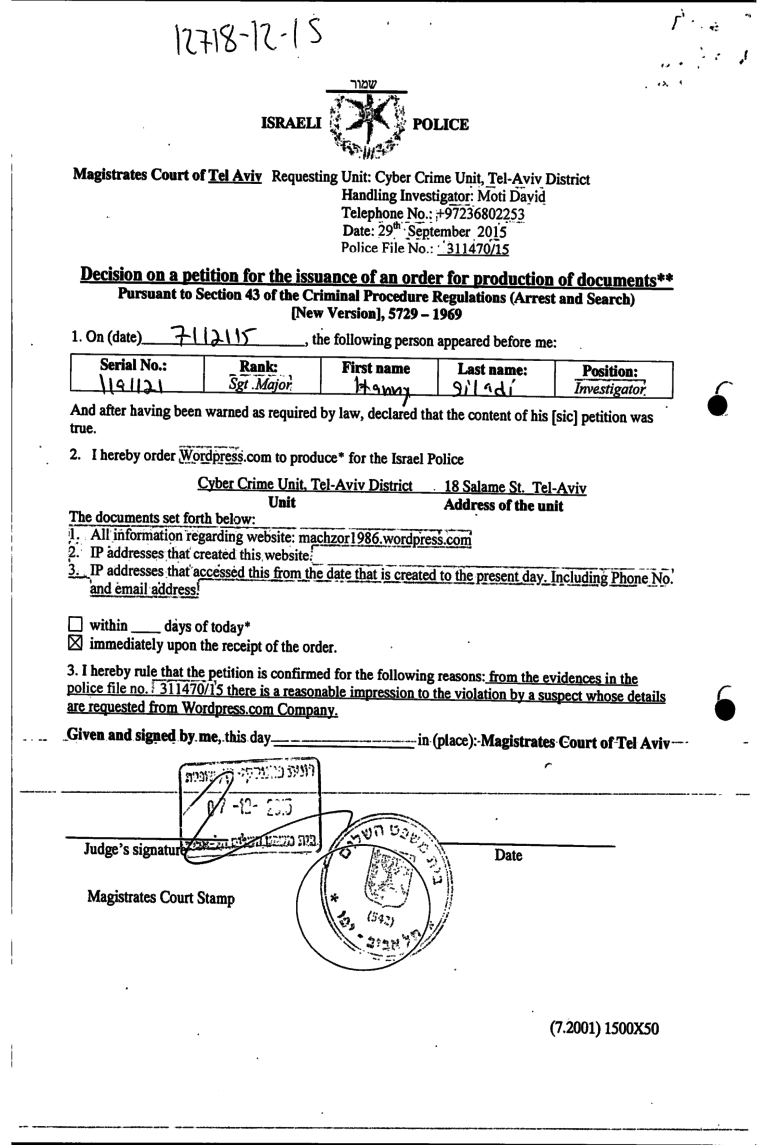 Judge Poznanski-Katz went on to flat out lie: “I hereby rule that the petition is confirmed for the following reasons: form the evidences in the police file no. 311470/15 there is a reasonable impression to the violation by a suspect whose details are requested from WordPress.com Company”. The court documents include a print-out of a post no longer available on machzor1986.wordpress.com, containing a photo of a woman raising her hands and the text (in Hebrew) “Dror testing”. Very subtle, Israel Police :/
A complaint, filed with Chief Justice Esther Hayut three years later by the Association for Civil Rights in Israel (ACRI), originated in a complaint filed by suspect Shem-Tov against Judge Poznanski-Katz, when the latter successfully petitioned the High Court of Justice to reverse her dismissal following another embroilment.
Judge Poznanski-Katz went on to flat out lie: “I hereby rule that the petition is confirmed for the following reasons: form the evidences in the police file no. 311470/15 there is a reasonable impression to the violation by a suspect whose details are requested from WordPress.com Company”. The court documents include a print-out of a post no longer available on machzor1986.wordpress.com, containing a photo of a woman raising her hands and the text (in Hebrew) “Dror testing”. Very subtle, Israel Police :/
A complaint, filed with Chief Justice Esther Hayut three years later by the Association for Civil Rights in Israel (ACRI), originated in a complaint filed by suspect Shem-Tov against Judge Poznanski-Katz, when the latter successfully petitioned the High Court of Justice to reverse her dismissal following another embroilment.
Israel Police Prods WordPress.com Compliance Using Fake Blog & False Subpoena
[Published January 30, 2019]
TL;DR: Israeli police obtained a subpoena, based on intentionally false information, with the judge’s knowledge, for the identity of a WordPress.com blog owner, which was, in fact, the police itself, to uncover how Automattic, WordPress.com’s owner, handles such orders, and whether it informs bloggers of subpoenas relating to them.
Machzor1986 (Hebrew for “Class 1986”) is a blog on WordPress.com, Automattic‘s blog hosting platform. It contains all of three posts, one showing a photo of a man and a woman in what seems to be a club, one with a stock photo of a girl looking up, basking in the sun, and a third with a broken image. There’re no headlines or text. The stock girl elicited one one-word comment, the Hebrew word for “cool”, posted by the blog owner. All posts and the comment are timestamped Dec 2015. Just another boring blog on WordPress, and a defunct one at this. But there’s actually a really interesting story behind it, published today by Haartez’s Revital Hovel. (Hebrew version available here.)
In early 2017, Israeli police arrested six suspects in what has been named the Web Terror Affair, suspected among other things of running a network of blogs, some of them on WordPress.com, defaming judges, social workers, prosecutors, cops and physicians, for their alleged part in removing children from their parents’ custody.
Court documents relating to one of the suspects, Lori Shem-Tov, revealed that before contacting Automattic for the suspects’ identities and information, police wanted to make sure such a request wouldn’t prematurely reveal their investigation to the suspects. So they plotted a scheme: They would set up a blog on WordPress.com, then subpoena the fake blogger’s identity claiming he’d violating Israeli law, and wait to see if Automattic notified the fake blogger about the subpoena.
In order to achieve this, the police would need to either genuinely violate the law on the blog, provide false information to a judge, or persuade a judge to cooperate and deliberately issue a subpoena using inaccurate details. They chose the last option, perhaps assuming that having a judge supporting their side would be a safer course of action.
Their request, submitted by Advanced Staff Sergeant Major Elli Lurie, said (in Hebrew) that “Since it’s a delicate subject and a work interface with WORDPRESS.COM hasn’t been established yet, we don’t have an indication whether our requests to them reach the woman who runs the requested sites. To check this we opened a site on WORDPRESS.COM called machzor1986.wordpress.com. We’re asking for a subpoena for this site for the aforementioned indication”. Ironically, it was important for Lurie to make it clear that the police wasn’t breaking the law – the privacy law, anyway: “We hereby declare that this site is under our control meaning that receiving information about it doesn’t constitute any kind of privacy invasion”.
The next day, Sergeant Major Hanny Giladi appeared before Tel Aviv Magistrate’s Judge Ronit Poznanski-Katz, declaring under oath that the petition was true. Judge Poznanski-Katz issued the subpoena, in English, requiring “Wordpress.com” (and not Automattic, the company that runs it), to produce for Israel Police “All information regarding website: machzor1986.wordpress.com[;] IP addresses that created this website[;] IP addresses that accessed this from the date that is created to the present day. Including Phone No. and email address […] immediately upon the receipt of the order” (all mistakes sic).![israeli police doc]() Judge Poznanski-Katz went on to flat out lie: “I hereby rule that the petition is confirmed for the following reasons: form the evidences in the police file no. 311470/15 there is a reasonable impression to the violation by a suspect whose details are requested from WordPress.com Company”. The court documents include a print-out of a post no longer available on machzor1986.wordpress.com, containing a photo of a woman raising her hands and the text (in Hebrew) “Dror testing”. Very subtle, Israel Police :/
A complaint, filed with Chief Justice Esther Hayut three years later by the Association for Civil Rights in Israel (ACRI), originated in a complaint filed by suspect Shem-Tov against Judge Poznanski-Katz, when the latter successfully petitioned the High Court of Justice to reverse her dismissal following another embroilment.
Judge Poznanski-Katz went on to flat out lie: “I hereby rule that the petition is confirmed for the following reasons: form the evidences in the police file no. 311470/15 there is a reasonable impression to the violation by a suspect whose details are requested from WordPress.com Company”. The court documents include a print-out of a post no longer available on machzor1986.wordpress.com, containing a photo of a woman raising her hands and the text (in Hebrew) “Dror testing”. Very subtle, Israel Police :/
A complaint, filed with Chief Justice Esther Hayut three years later by the Association for Civil Rights in Israel (ACRI), originated in a complaint filed by suspect Shem-Tov against Judge Poznanski-Katz, when the latter successfully petitioned the High Court of Justice to reverse her dismissal following another embroilment.
 Judge Poznanski-Katz went on to flat out lie: “I hereby rule that the petition is confirmed for the following reasons: form the evidences in the police file no. 311470/15 there is a reasonable impression to the violation by a suspect whose details are requested from WordPress.com Company”. The court documents include a print-out of a post no longer available on machzor1986.wordpress.com, containing a photo of a woman raising her hands and the text (in Hebrew) “Dror testing”. Very subtle, Israel Police :/
A complaint, filed with Chief Justice Esther Hayut three years later by the Association for Civil Rights in Israel (ACRI), originated in a complaint filed by suspect Shem-Tov against Judge Poznanski-Katz, when the latter successfully petitioned the High Court of Justice to reverse her dismissal following another embroilment.
Judge Poznanski-Katz went on to flat out lie: “I hereby rule that the petition is confirmed for the following reasons: form the evidences in the police file no. 311470/15 there is a reasonable impression to the violation by a suspect whose details are requested from WordPress.com Company”. The court documents include a print-out of a post no longer available on machzor1986.wordpress.com, containing a photo of a woman raising her hands and the text (in Hebrew) “Dror testing”. Very subtle, Israel Police :/
A complaint, filed with Chief Justice Esther Hayut three years later by the Association for Civil Rights in Israel (ACRI), originated in a complaint filed by suspect Shem-Tov against Judge Poznanski-Katz, when the latter successfully petitioned the High Court of Justice to reverse her dismissal following another embroilment.


















